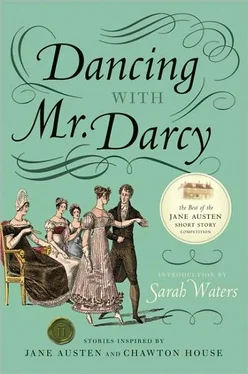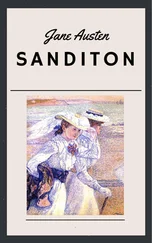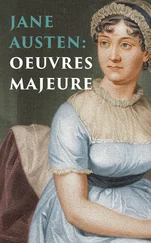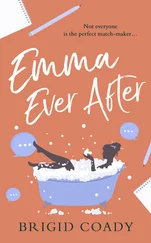Dancing with Mr. Darcy:
Stories Inspired by Jane Austen and Chawton House Library
COMPILED BY SARAH WATERS
From Bridget Jones’s Diary to Bollywood’s Bride and Prejudice, from the Regency-horror mash-up Pride and Prejudice and Zombies to the forthcoming sci-fi film Pride and Predator, it seems that Jane Austen’s work is being appropriated by contemporary culture in ever more playful and creative ways. The fact that most of the modern interest in Austen converges on just one of her novels, however, suggests that the role she plays for us might actually be dwindling, even as her presence around us seems to be on the increase. It’s as if Pride and Prejudice has become a sort of shorthand for a whole style of literature, distracting us from the range and depth of its author’s work, and offering us instead a cartoon Austen, a thing of fussy bonnets and silly manners, easy to pastiche. When I was approached by Chawton House Library and invited to judge the final stage of the short-story competition which formed the basis for this anthology, I was delighted, but also trepidatious – fearful that I would find this cartoon Austen reproduced in the stories I was asked to judge; that I would encounter nothing but Elizabeth Bennets engaged in perpetual pallid dalliances with cardboard Mr Darcys.
But my first glance at the longlisted entries was reassuring: I saw some startlingly unAusten-like titles, and an impressive array of settings and styles. In fact, so individual did the stories prove to be, the process of assessing each against its competitors became a highly challenging one. Feeling I needed to lay down some ground rules, I decided on three main criteria. First, it seemed to me that I had to be looking for something well written – a concept which, I fully understand, can mean different things to different people, but which for me meant something written with flair, by an author with an obvious talent for putting words together; but something written with skill and confidence, too – something to make me feel that, as a reader, from the first word to the last I was in good hands. Second, since this was a short-story competition, I also wanted to see stories really working as stories: there were some lovely pieces of writing that I rejected, regretfully, because they felt to me like fragments of prose, rather than the well-crafted, self-contained structure I felt a good short story should be. And finally, since this was a Jane Austen short-story competition, I wanted the stories to have some really meaningful connection with Austen herself. I was pretty flexible about this. As far as I was concerned, the connection might have been a very obvious engagement with the novelist, her work, her Chawton home or Chawton House Library; or it might have been something much more abstract; but I felt it needed to be there.
Each of the stories selected for this anthology meets all of these criteria: each is well written and well crafted, and between them they use Austen and her work in diverse and quite fascinating ways. A few are directly inspired by Austen’s texts – ‘Somewhere’, for example, teases out a new story from between the lines of Mansfield Park to give us a poignant study of compromise and loneliness. Others are true to the spirit rather than the letter of Austen’s novels; none is ‘romantic’ in the conventional sense, but many show youthful protagonists dealing with desire and attraction – suggesting that, although young people in the twenty-first century have the kind of social freedoms that would have been unimaginable to their Regency counterparts, love and courtship remain thrilling but difficult to manage. Still others reflect on the meaning of Austen for her modern readers – with both ‘Snowmelt’ and ‘Cleverclogs’, for instance, in different ways testifying to the power of reading itself, and reminding us of the continuing importance, in our noisy, crowded world, of the quiet, solitary spaces in which literature can be prioritised and savoured.
Given the strength and range of these and the other short stories gathered here, I found it very difficult to choose a winner and runners-up. But three stories kept drawing me back. ‘Jayne’ appealed to me right from the start. I liked its economy, and its irreverence, and the thoughtfulness with which that irreverence is underpinned – for though the world of its glamour-model narrator might at first glance seem far removed from that of Austen’s decorous heroines, Jayne’s grip on female economic realities, and on the strategies available for negotiating them, is actually thoroughly Austenesque. I found myself haunted, too, by ‘Second Thoughts’, an ambitious story, told from Austen’s perspective and in the idiom of her novels, which attempts to bring to life an agonising moment from the novelist’s own romantic career. The result is a deceptively spare piece of writing, beautifully crafted and paced, infused with real emotional power.
These two stories make very fine runners-up indeed, but it was ‘Jane Austen over the Styx’ that I finally chose as my winner. It’s another story which attempts, and succeeds in, the tricky business of emulating Austen’s voice – this time, to take us on a fantastic journey into Hades, where the novelist is judged by a panel of aggrieved female characters from her own books. It’s a story with a shape, a craft; a purpose: a memorable piece of writing, engaging stylishly and intelligently with Austen’s fiction and reputation.
What all the stories in this anthology show, in fact, is the continuing resonance of Jane Austen for modern readers and writers. None is a simple homage to the novelist, but each, in a sense, is a celebration of her work; and collectively they lead us back to her with fresh eyes. It was a pleasure to read and to judge them.
Sarah Waters
June, 2009
Falling in Love with Jane
I fell in love with the novels of Jane Austen when I was thirteen. I remember sitting in a 1950s prefab that was more greenhouse than classroom. We had wooden slanting desks, the inkwells stuffed with gum and chewed paper. I would have loved a proper inkwell with proper ink. The school was in Dorking, and the view from the playing fields was of Box Hill. That was the only picturesque element. There was no Mr Darcy. I don’t know if the boys were reluctant to dance as I didn’t go to the discos. I do remember their bobbly nylon blazers, and how skilled some of them were in the trapping and torture of wasps.
There was a Wickham, a disreputable ginger tom who moved in with my family. We never knew his real name. One day he disappeared (eloped? off with the militia?) leaving me with nothing but rings of flea bites around my ankles. I told people that they were mosquito bites, hoping to give myself the glamorous aura of a girl whose family took foreign holidays during term-time. These were difficult years. We understood only too well the precariousness of some Austen heroines’ situations.
It is the appeal of her heroines that makes Austen’s work so enduringly popular. She challenged her readers by offering them characters and heroines who were not always immediately engaging. Many of the competition entrants sought to give voices and new destinies to some of the less appealing or more minor characters. There were hundreds of entries. Reading them was a delight; choosing a shortlist was horrible. Fanny Price, Mary Bennet and Miss Bates (or later incarnations of them) proved to be very popular subjects. I particularly liked a story in which Mary Bennet had a happy ending as a seafarer. I wondered whether the writer of that one had once wished she was Lizzy, but feared that she was more like Mary; I know I did.
Читать дальше












